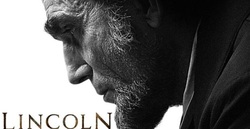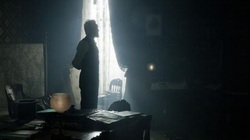
Director: Steven Spielberg
Starring: Daniel Day-Lewis, Sally Field, David Strathairn, Joseph Gordon-Levitt, James Spader, Hal Holbrook, Tommy Lee Jones, John Hawkes, Michael Stuhlbarg, Jared Harris and Jackie Earle Haley
Review Written By: Michael Dalton (Prime Minister)
Stylistically, Lincoln is an outlier in Spielberg’s filmography. A filmmaker commonly associated with blockbusters and whose more serious fare still has its more sweeping flourishes (The opening twenty minutes of Saving Private Ryan, the black and white photography of Schindler’s List) Lincoln is a much more dialogue and performance driven film than we are accustomed to from him. While the material doesn’t lend itself to the type of action sequences we associate with Spielberg, the presentation of the film is subtle and subdued by anybody’s standards. If you were to watch the film not knowing who directed it, Spielberg wouldn’t be the first name to come to mind. This film lacks both his renowned positive and negative qualities. Visually, this is a film which looks like it could have been first presented, and wouldn’t have lost anything by being, on TV. Not that he needs to prove anything and not that this material demands it, yet there is also a significant lack of risks being taken here. The whole thing has a very pedestrian, professional air about it that while delivers a solid film, never truly surprises or moves you. This however is not a film that aspires to, or should be judged, based solely upon its visuals. This is a writers and more so, an actors film.
It was said that Tony Kushner’s first draft of the screenplay (Based on the book, A Team of Rivals: The Political Genius of Abraham Lincoln, by Doris Kearns Goodwin) was a thousand or so pages long, with Spielberg electing to take the microcosm biopic approach and focus solely on the fight to pass the 13th amendment. This film very much feels as if its screenplay is a smaller part of a larger piece. While the central conflict of the film is fully explored and realized, others slightly fall by the wayside and aren’t followed through. The struggles with his wife, his son and the entire civil war linger in the background, are briefly explored and then ignored. This isn’t a film that needs to be any longer and perhaps it just displays that such material and such a story would be better explored in a medium that would allow multiple hours of storytelling spread across multiple weeks. However while aspects may be underdeveloped, within Lincoln’s many anecdotes rest some of the best-written scenes of recent time. Ranging from profound to humorous, Kushner’s dialogue manages to pull off the balancing act of being electric and memorable, yet not at the expense of realism. While it may be harsh to label the film visually stale and state that its script is underdeveloped, it is crucial to interpret neither of these words as substitutes for bad.
Like Zero Dark Thirty, yet in my opinion more so, this film requires a pre-possessed interest in the material in order to appreciate it. Due to the nature of this film’s presentation, if you have no interest whatsoever in Abraham Lincoln, politics or history, then this may be the most boring film you’ll ever see. Even with such interests, due to the subdued and intentionally slow and dense nature of its execution, this is a film, which will be respected and admired rather than loved by the majority of those who view it. This isn’t the kind of film you’d pop in after a long week on a Friday night, not that every film needs to be that. The film’s opening scene is one that is driven by performances and dialogue, is visually subdued and yet one that manages to be incredibly moving come its conclusion, as a black soldier walks away quoting the closing lines of the Gettysburg Address. It is a moment, which sets up the film beautifully, yet one that it never quite matches again.
What is undoubtedly the strongest aspect of this film and what makes the film, is the acting. As was expected and as has been said many times, Daniel Day-Lewis is phenomenal as Abraham Lincoln. This is a performance for the ages in the sense that anybody after seeing this film will picture Day-Lewis’ performance when somebody mentions the name Abraham Lincoln. With this transformative, believable, chameleonic, commanding performance, he has become intertwined with the great man himself, by doing everything humanly possible to become him. However the film has a litany of supporting players, all of whom ensure that this film contains one of the most accomplished ensembles of recent years. At times this can get distracting as you struggle to determine where exactly you remember them from and frustrating as you wish some of them were given more to do. Such actors include Dane DeHaan, John Hawkes, Michael Stuhlbarg, Joseph Gordon-Levitt, Jackie Earle Haley and Hal Holbrook. There is not a single bad performance in the film and while Day-Lewis is undoubtedly the star, he is allowed to shine because of the hard and realistic work of his co-stars.
Overall while Lincoln could be riskier, could have more directorial flair, could have developed its characters and subplots further and can at times become a victim to it’s own construction, it is an incredibly professionally made film that contains some of the best pieces of dialogue and acting you will see all year. Day-Lewis gives what will go down as one of the all time great performances and it represents a demonstration of restraint, maturity and immense respect for the material from Steven Spielberg.

Rating: 7/10
By Movie Parliament Prime Minister,
Michael Dalton
Disagree with this review? Give us your thoughts in the comments below
 RSS Feed
RSS Feed
